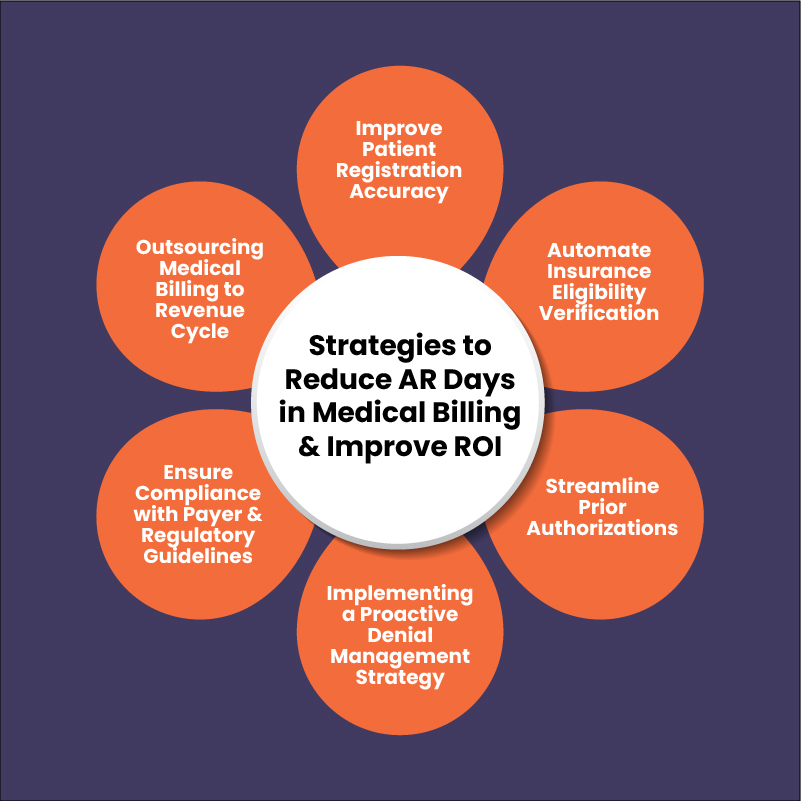
In the fast-evolving world of healthcare revenue cycle management (RCM), minimizing Accounts Receivable (AR) days is critical to maintaining cash flow, maximizing reimbursements, and ensuring long-term financial health. An increase in AR days often points to inefficiencies in claim processing, insurance verification, follow-ups, and patient collections - leading to delayed payments and potential revenue loss.
To stay financially resilient and operationally efficient, healthcare providers must adopt targeted strategies that streamline billing workflows, reduce denials, and accelerate payments. This article outlines six proven strategies to reduce AR days and strengthen the revenue cycle.
How to Reduce AR Days and Optimize Revenue Cycle Management
Reducing AR days is a top priority for healthcare providers aiming to improve financial performance, boost reimbursement speed, and reduce administrative waste. By applying best practices in billing, automation, compliance, and collections, organizations can make significant strides in achieving these goals.
Here are six strategies to help you reduce AR days effectively:

1. Improve Patient Registration Accuracy
One of the primary causes of delayed or denied claims is inaccurate patient registration. The ECRI Institute ranks incorrect or missing data in electronic health records among the top 10 patient safety concerns. Errors in demographic details, insurance verification, or prior authorizations can all lead to costly delays.
Best Practices:
- Utilize real-time eligibility verification tools to confirm insurance coverage before service.
- Ensure patient demographics - name, date of birth, policy numbers—are captured accurately.
- Automated registration processes to reduce manual input errors.
- Train front desk staff thoroughly on insurance protocols and data entry standards.
2. Automate Insurance Eligibility Verification
Insurance verification errors are a major cause of claim denials. According to the American Hospital Association (AHA), denial rates have increased by over 20% in the last five years, with many providers facing average denial rates of 10% or more.
Best Practices:
- Implement electronic verification systems integrated with your EHR.
- Confirm insurance coverage, deductibles, and co-pays prior to patient visits.
- Send pre-authorization reminders to reduce claim delays.
- Cross-verify patient data with payer databases for accuracy.
3. Streamline Prior Authorizations Workflows
Delayed or missing prior authorizations lead to treatment disruptions, denials, and prolonged AR cycles. A well-structured process can mitigate these issues.
Best Practices:
- Centralize authorization processes under a dedicated team.
- Use AI-enabled tools to automate tracking and submissions.
- Maintain a payer-specific database for faster response and compliance.
- Conduct regular audits to identify and eliminate bottlenecks.
4. Implementing a Proactive Denial Management Strategy
Denied claims don’t just slow revenue - they cost money. Reworking a denied claim can cost an average of $25 per claim in physician practices and $181 in hospitals. A proactive denial strategy can dramatically reduce these expenses and speed up payments.
Best Practices:
- Leverage analytics to identify root causes of denials and target high-impact improvements.
- Create a structured appeal process with consistent follow-up procedures.
- Provide ongoing education for coding staff on ICD-10, CPT, and HCPCS updates.
- Establish a dedicated denial prevention team to track trends and drive continuous improvement.
5. Ensure Compliance with Payer and Regulatory Guidelines
Failure to adhere to payer rules or healthcare regulations results in preventable denials and penalties. Staying complaint is essential for maintaining clean claims.
Best Practices:
- Stay current on CMS, HIPAA, and individual payer requirements.
- Train staff regularly on documentation standards and billing updates.
- Conduct internal audits to ensure regulatory compliance.
- Monitor denial data to detect compliance-related issues early.
6. Outsource Medical Billing to RCM Experts
Outsourcing medical billing to experienced revenue cycle partners allows healthcare providers to focus on patient care while improving financial outcomes. Leading RCM firms bring advanced technology, skilled personnel, and deep regulatory knowledge.
Benefits of Outsourcing:
- Access to certified coders and billing professionals.
- Use analytics and cloud-based solutions.
- Full regulatory compliance with HIPAA and CMS standards.
- Cost-efficient services that reduce administrative burden and AR days.
Final Thoughts
Reducing AR days is not a one-time fix - it requires a sustained, strategic approach driven by data, technology, and operational discipline. From improving front-end processes to leveraging automation and outsourcing, healthcare organizations can unlock faster payments, reduce overhead, and strengthen their financial health.
About Pena4
At Pena4, we are leading specialists in end-to-end revenue cycle management solutions that help medical practices reduce AR days, increase cash flow, and focus on delivering exceptional care.




